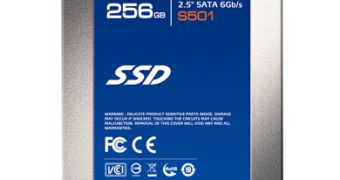Without informing anyone of the change, ADATA has replaced the original S501 high-performance solid state disk with a slower version of the same drive, dubbed the S501 V2.
At the end of 2010, in December to be more precise, ADATA has announced the introduction of the S501 SSD series which promised to offer read transfer rates of up to 480MB/s and writes of 310MB/s thanks to a high-performance Marvell controller.
This values made the drive one of the fastest SSDs available on the market, surpassing many other such solutions and even outperforming some RAIDed solid state drives available back then.
The victory, however, was only short lived as, for an unknown reason, ADATA has decided to retire the original version of the drive from the market and replace it with a newer version which had slower sequential read and write transfer rates.
As ComputerBase reports, the slowdown was caused by the fact that the initial Marvell controller was swapped with an older SSD processor.
When compared to the original S501, the V2 version is only capable of reaching 355MB/s read and 215MB/s write speeds, the same exact values as the Crucial RealSSD C300.
Right now, the original S501 has been removed from ADATA's website as only the new S501 V2 version is listed.
Further more, the situation seems to be similar in retail as online stores have only the V2 SSD available in their inventory.
The reason why ADATA chose to go this route is still uncertain as the company hasn't issued any official statements regarding this matter.
ADATA isn't the only company to deliver slower performing drives without notifying anyone as recently OCZ has done almost the same thing with its lower capacity SandForce-based SSDs when it transitioned from 34nm to 25nm NAND Flash.
After numerous complains, OCZ has decided that customers who were affected by this issue are eligible to receive an updated 25nm SSD.
However, it is important to note that, unlike OCZ, ADATA has labeled the new version of the drive and that it has listed the new updated performance values on its website.

 14 DAY TRIAL //
14 DAY TRIAL //